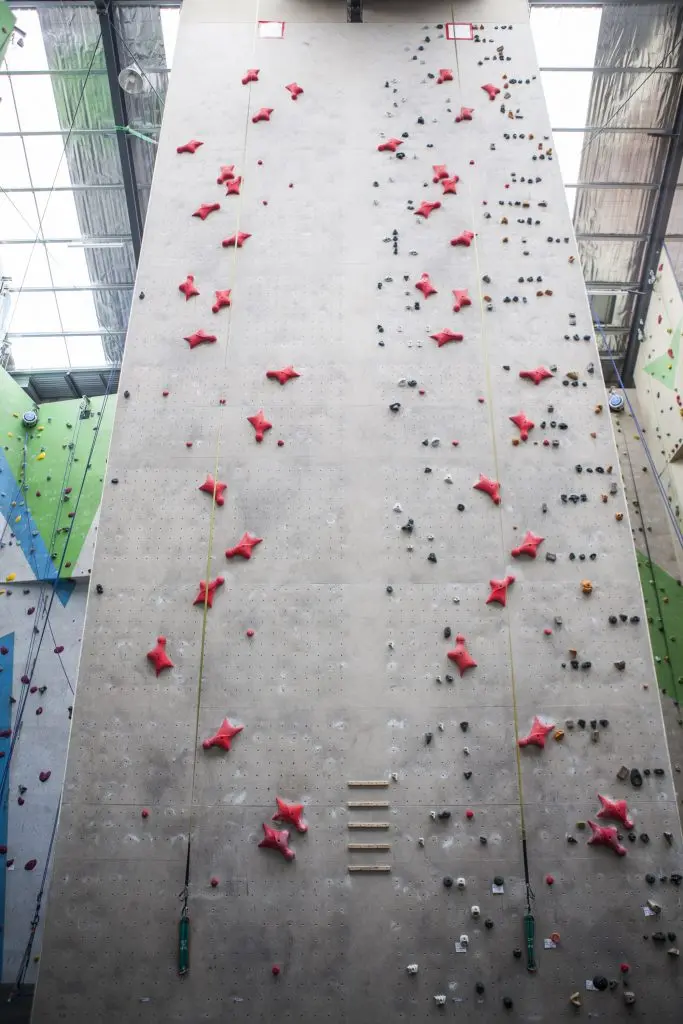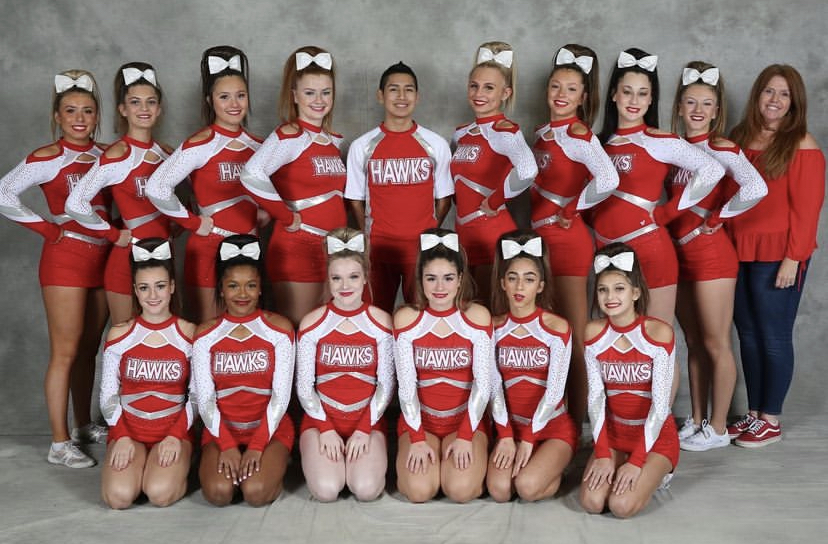He was here.
He rounded the corner of the climbing gym and introduced himself as our new coach.
We had been looking forward to this day for so long and it had finally arrived. When we first caught sight of him, we were beyond excited. We had been hearing rumors that he was coming to coach. We finally had a coach: someone who was very familiar with the niche discipline of competitive speed climbing and could help us improve.
Athletes know how vital a good coach is.
“Someone who connects with each athlete and helps their individual needs. Also, someone who is motivating in a positive way and creates room for growth,” saidAthlete A.
This is something I failed to receive from my coach.
Athlete B believes that “a good coach is someone who understands the discipline that they are coaching and also the athletes that they are coaching.”
Our new coach was well-qualified with many national records and a member of the US national team for many years. This was certainly an upgrade from only having coaches who didn’t know much about speed climbing. However, his coaching methods didn’t work well for us.
“At first I thought he was a very good coach. I knew about his past achievements in the sport so I was excited to be coached by someone I knew got to such a high level. The first few practices were hard but I told myself that it was okay because it should be hard if I wanted to get better,”said Athlete A. “When I heard other people telling me about their concerns I got a little worried but I ignored it because I wanted to believe he was a good coach.”
He knew a lot about the sport and he was giving us what seemed to be good, speed-specific workouts – something we never had access to before. However, we were just blindly following him, using his experienced background as a justification for all of his actions.
Within the first month, it began to be routine that we would feel nauseous, lightheaded, and familiar with the feeling that we were about to pass out or throw up; or both. Many teammates, friends, and family members have caught on that we returned from these practices far too tired for our own good. We internalized every word he said, clouding our minds with the idea that these intense drills and workouts that he was giving us were making us stronger, as there was no doubt that he wasn’t the perfect coach we had always dreamt of. Whenever he said that he had done something during his training, we took long measures to ensure we did it too.
When we first came to him with our issues of feeling nauseous, he told us that he never drank water or ate within an hour of practice or during it. So we stopped drinking water during practice, which, in turn, led us to feel constantly lightheaded and increased dehydration.
“Over time I started to question his coaching style especially when I saw people crying at practice and I was throwing up on a regular basis,” said Athlete A.
At practice, we began with drills. During this time, all of us were quite new to the skills we were trying, so naturally we were falling a lot. It is part of the learning process. This happens to everyone. However, our coach didn’t think it was acceptable.
We would mess something up and before we would try it again, he would say, “Just do it.”
While it might appear that this was said in a lighthearted, humorous manner, as he showed up every week with a contagious smile on his face, he was dead serious about what he said. He wanted us to “just do it.”
After this had continued for two months, we slowly began to realize that these drills and the mindset he was forcing upon us were not healthy. You shouldn’t be feeling like you are going to pass out during each practice. One of our friends made sure that we could see this and there were a few instances where she coached us outside of practice.
“Then when someone else coached me in a much more positive way, my eyes opened to what it is like to grow without fear and what a good coaching environment can be,” said Athlete A.
When athlete A discusses our coach, she often describes the fear she encounters. The practice had become a place that we dreaded going to. We were scared; scared to push our body and mind too hard. If we messed up a move, we felt as if we were a disappointment to him. We were constantly living in fear that he would lash out and punish us with extra workouts or brutal drills. This is not healthy for us. We should not have come to the point where this sport that we love has come down to practicing in fear.
All of us found climbing in different ways, but all of us use it now as an outlet; something of a safe area. Climbing was a place where we could be ourselves and take our minds off stressors from the outside world. When we were dreading going to practices, our outlet essentially disappeared.
“At the beginning, he was nice and I was improving at a rate greater than before but as time went on, he started becoming more mean,” said Athlete B.
Once when the youngest of our team messed up a new skill, he naturally sought our coach’s advice. Justifying as to why he fell, he said “I forgot to move my hands.”
The smile plastered on our coach’s face masked the severity of his next words.
“So move your hands.”
This is all he cared to say. Simple problems require simple solutions.
Yet they weren’t simple. Speed climbing takes time to learn the intricacies of it. It’s not mastered quickly by any means and both the coach and the athlete must have patience. Our coach did not have patience for us. He pushed us too hard and too fast. Our rest was extremely limited and he did not even allow us to sit down during our breaks. We were forced to stay on our feet and we were strongly encouraged to not eat or drink.
He told us, “Before every good run I had I felt like I was going to have a heart attack.” So if we felt nauseous or lightheaded, we thought that it was okay, or even good.
Athlete A believes that coaches, “Should set [the athletes] up to be able to guide themselves through competitions or just have a positive experience to look back on that helps them in other aspects of life” and “guide them through competitions in a way that helps them perform at their best while still enjoying their sport.”
Our coach failed to do this for us. He caused athletes to lose their love for the sport and his mentality affected us outside of practice as well.
Athlete A, an enthusiastic competitor who left all other sports to solely focus on this one, began to lose her love for this sport due to our coach’s tough policies.
“I think the things that he would say were the most harmful.”
She started training different moves for the past month solely because he told her she should. One move in particular, called the Tomoa, was very challenging and took other athletes many months to be able to do consistently. “He would tell me that I couldn’t do things or I had to do something or else I could never do it again. He would put so much pressure on just a normal practice that I did not feel safe to ask questions or make mistakes.” After one month, she was threatened with the consequence that she had one week to get the move constantly or she would not be able to train that move for three years. This is obviously an unfair and inappropriate response.
No coach should ever threaten an athlete or expect them to have moves dialed that they don’t have the physical capacity to do yet. This is not acceptable and extremely detrimental to physical and emotional growth. In one instance, he told this athlete “Your body is just not made for the Tomoa.” This mindset is so beyond unhealthy. It is these words that can promote body dysmorphia and needless insecurities.
“They made me question myself a lot and lose a lot of the confidence I used to have in my climbing. I started to climb in order to meet the expectations he set for me instead of climbing because I love it and enjoy doing it. I would constantly feel overwhelmed and would put a lot of unrealistic pressure on myself which eventually led to constant breakdowns.”
Athlete B articulated that our coach, “Only cares about the performance of the athletes.” He doesn’t care about the rest of our lives. To one of the athletes, our coach directly said, “It doesn’t matter how you feel.”
In addition to the toxic mindset and hard practices, our workouts were too intense, unhealthy, and not appropriate for our age and level. One of the workouts that I felt was particularly unhealthy was the pull-ups. Some of us could barely do 16 pull-ups with body weight, yet our coach forced all of us to add weight. As you can imagine, we were not able to complete all 16 reps. We were forced to use boxes to assist our pull-ups when we could no longer complete a rep without assistance. This seems quite contradictory; shouldn’t we then just not use the added weight or the box?
No, of course not. As he said, we needed to “get used to using the weight,” and forced us to continue practicing with these unhealthy workouts.
We were doing pull-ups until failure and then using a box as assistance to finish the set; often going to failure again, even with the extra help. Going to failure does not build physical strength and increases the likelihood of injuries.
At some point, he deemed that I was “using the box too much” so he proceeded to spot me with his hands. In the beginning, I saw this as normal. I was still under the delusion, and I still idolized him in my mind. Only when fellow teammates walked in while he was spotting me in such a manner and I saw the looks on their faces, I began to realize that this wasn’t okay. After further discussion with them, I realized that he never asked permission to touch me like that and I was embarrassed that I had simply let that happen. Although I didn’t have a specific problem with it, it is still not acceptable that he didn’t ask permission before touching me. He did this to all of my teammates, not just me, and never asked for consent from any of us.
Sooner after, our team went to our head coach to discuss this inappropriate and degrading coaching style. We were promised that she would confront him about his unhealthy approach. I do not intend to offer forgiveness for his actions, though I’m hopeful that these practices will once more be a place where I can find joy and peace.
Although his coaching certainly took a toll on us, mentally and physically, not all of his methods contained negative aspects. Throughout our struggles, I did learn many lessons. In terms of my climbing, he did help me with the move I was working on. I saw improvement. He taught me the importance of strong dedication and commitment to learning the move. I learned how to pay attention to my body positioning and was able to determine how I needed to move my body to do the move.
On the contrary, I learned just how valuable first impressions are. Through conversations with other coaches, he began to shift his coaching style to one more appropriate, although his old self still found ways to disrupt our learning every once in a while. This shift in coaching still couldn’t make up for the three months when we dreaded going to practice every week. I am trying my very best to move on and accept his new style of coaching openly, knowing that it required a large change on his part, but those months when our bodies were challenged indefinitely and our minds cluttered with self-doubt and fear will never be forgotten.
~~~~~~~~~~~~~~~~~~~~~~~~~~~~~~~~~~~~~~~~~~~~~~~~~~~~~~~~~~~~~~~~~~
I’m choosing to publish this article anonymously to protect the individuals I talk about. I don’t feel like this is a topic that is often approached which led me to feel uncomfortable sharing my identity and those of my teammates and coaches when discussing this.



